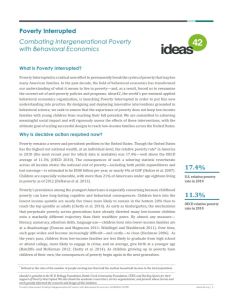Join getAbstract to access the summary!

Join getAbstract to access the summary!
Ideas 42
Poverty Interrupted
Combating Intergenerational Poverty with Behavioral Economics
2015
What's inside?
Insights from behavioral economics can help poor children and their parents focus on what really matters – beyond food and shelter.
Recommendation
Poverty affects not only an individual; it can also have lasting effects on families and communities for generations. “Poverty Interrupted” is an initiative by Ideas42. Here, the think tank explains its innovative approach to eliminate poverty in the US by encouraging small investments today. This report, which could have gone into more detail, highlights how Poverty Interrupted plans to use behavioral economics to remedy the long-term implications of poverty. getAbstract recommends the analysis to policy makers, economists, and to people working in governmental and nongovernmental organizations.
Summary
About the Author
Ideas42 is a think tank that uses behavioral science, especially economics, to design solutions to problems such as poverty, under-education, HIV and family planning. Ideas42 grew out of research programs in psychology and economics, and works with nonprofit organizations, government bodies and businesses.

















Comment on this summary